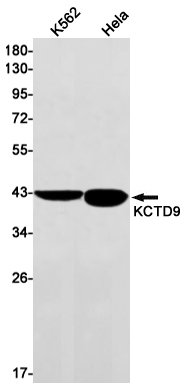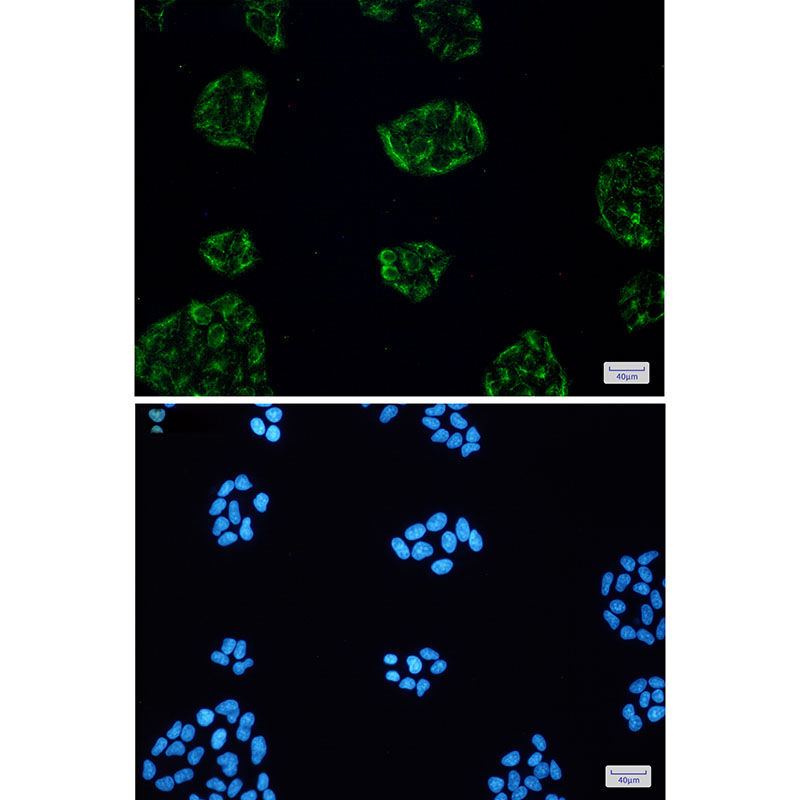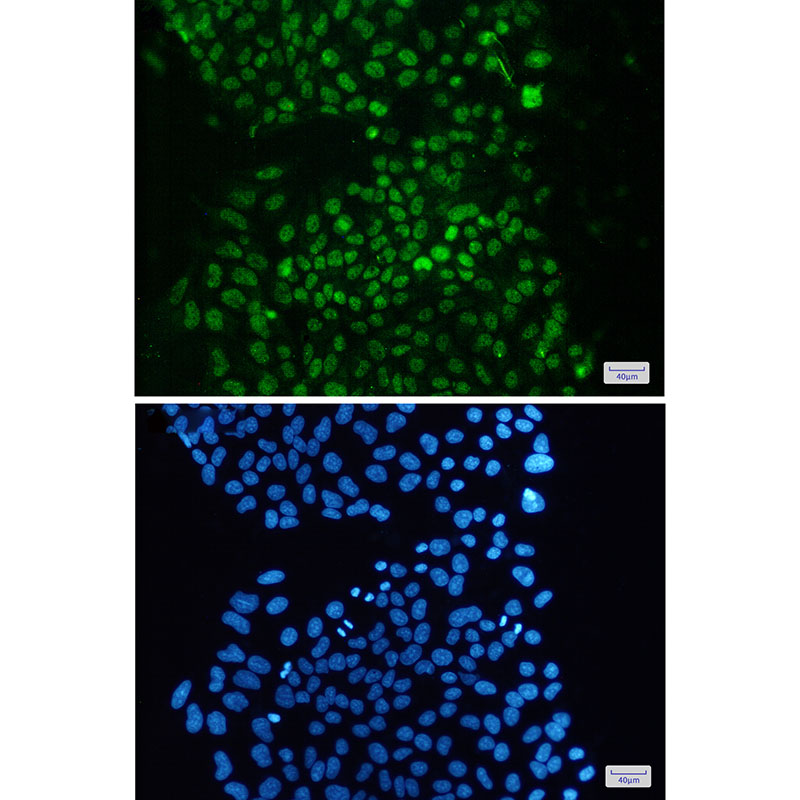


| WB | 1/500-1/1000 | Human,Mouse,Rat |
| IF | 咨询技术 | Human,Mouse,Rat |
| IHC | 咨询技术 | Human,Mouse,Rat |
| ICC | 1/50-1/200 | Human,Mouse,Rat |
| FCM | 咨询技术 | Human,Mouse,Rat |
| Elisa | 咨询技术 | Human,Mouse,Rat |
| Aliases | BTB/POZ domain-containing protein KCTD9 |
| Entrez GeneID | 54793 |
| WB Predicted band size | Calculated MW: 43 kDa; Observed MW: 43 kDa |
| Host/Isotype | Rabbit IgG |
| Antibody Type | Primary antibody |
| Storage | Store at 4°C short term. Aliquot and store at -20°C long term. Avoid freeze/thaw cycles. |
| Species Reactivity | Human |
| Immunogen | A synthetic peptide of human KCTD9 |
| Formulation | Purified antibody in TBS with 0.05% sodium azide,0.05%BSA and 50% glycerol. |
+ +
以下是基于KCTD9相关研究领域模拟的参考文献示例(实际文献可能需通过学术数据库进一步验证):
---
1. **标题**: "KCTD9 regulates cell proliferation and apoptosis in colorectal cancer via the ERK pathway"
**作者**: Zhang L, et al.
**摘要**: 本研究通过Western blot和免疫组化技术,使用KCTD9抗体检测其在结直肠癌组织中的表达水平,发现KCTD9通过调控ERK信号通路抑制肿瘤细胞增殖并促进凋亡,提示其作为潜在治疗靶点。
2. **标题**: "KCTD9 interacts with Cullin3 to form an E3 ubiquitin ligase complex"
**作者**: Wang Y, et al.
**摘要**: 利用KCTD9抗体进行免疫共沉淀实验,证实KCTD9与Cullin3结合形成泛素连接酶复合体,参与蛋白质泛素化降解过程,为研究KCTD9在蛋白质稳态中的作用提供机制依据。
3. **标题**: "KCTD9 expression correlates with neuronal differentiation and synaptic plasticity"
**作者**: Chen R, et al.
**摘要**: 通过免疫荧光和流式细胞术分析,发现KCTD9抗体标记的蛋白在神经元分化过程中表达上调,且与突触可塑性相关蛋白存在共定位,提示其在神经发育中的功能。
4. **标题**: "Proteomic analysis of KCTD9-deficient mice reveals metabolic pathway alterations"
**作者**: Kim H, et al.
**摘要**: 研究利用KCTD9敲除小鼠模型及抗体检测,发现KCTD9缺失导致肝脏脂代谢相关蛋白表达异常,表明其在代谢调控中的潜在作用。
---
**注意**:以上文献为示例性质,实际研究中请通过PubMed、Web of Science等平台检索最新文献。若需具体文章,建议结合实验方向(如癌症、神经科学等)细化关键词搜索。
The KCTD9 antibody is a research tool designed to detect and study the potassium channel tetramerization domain-containing protein 9 (KCTD9), a member of the KCTD protein family. KCTD proteins are characterized by a conserved N-terminal BTB/POZ domain, which facilitates protein-protein interactions, and a variable C-terminal region. KCTD9 is implicated in diverse cellular processes, including ubiquitination, transcriptional regulation, and modulation of ion channel activity, though its precise biological functions remain under investigation.
Studies suggest KCTD9 may act as an adaptor in cullin-RING ubiquitin ligase (CRL) complexes, targeting substrates for proteasomal degradation. It has been linked to cancer progression, particularly in gastric and colorectal cancers, where aberrant expression correlates with tumor growth and metastasis. Additionally, KCTD9 may influence neuronal signaling and developmental pathways.
The KCTD9 antibody is widely used in techniques like Western blotting, immunohistochemistry, and immunofluorescence to assess protein expression, localization, and interaction partners. Its specificity is often validated using knockdown/knockout models or peptide-blocking assays. Researchers employ this antibody to explore KCTD9's role in disease mechanisms, signaling cascades, and potential therapeutic targets. Commercial variants are available from multiple suppliers, with validation data typically provided for specific applications. Ongoing research aims to clarify KCTD9's multifunctional roles and its utility as a biomarker or intervention target.
×